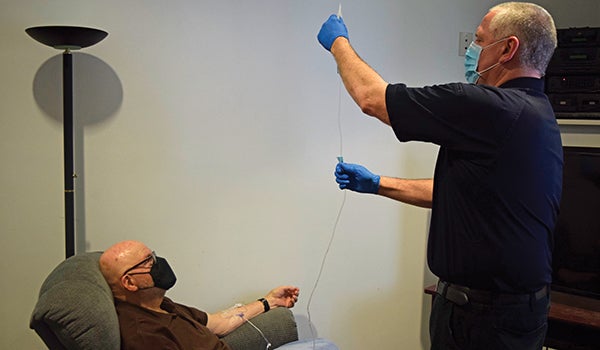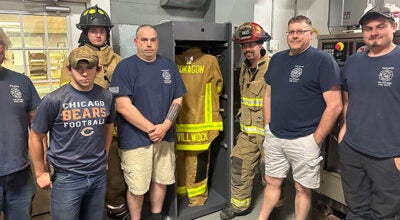Local EMS to deploy COVID-19 treatments in-house to high risk patients
Published 7:54 am Friday, May 7, 2021
|
Getting your Trinity Audio player ready...
|
SOUTHWEST MICHIGAN – A COVID-19 treatment for those suffering from mild to moderate symptoms may soon be administered right in patients’ homes.
The Southwestern Michigan Community Ambulance Service and its emergency medical services team are working together with area health systems, like Spectrum Health Lakeland, to bring a monoclonal antibody treatment to COVID-19 patients in higher risk categories from developing serious symptoms. The treatment type is allowed under the U.S. Food and Drug Administration, by way of an Emergency Use Authorization.
“We got a call about a month ago to seriously take this into consideration by the state. [There was a] request to all EMS agencies to become active in this,” said SMCAS Executive Director Brian Scribner.
SMCAS said “yes” to the call, and has been preparing to get the monoclonal antibody therapy into the bloodstreams of patients with mild to moderate symptoms of COVID-19.
“Spectrum Health Lakeland has done a great job with monoclonal antibodies. They’re one of the top providing hospitals in the state,” said William Fales, Michigan state medical director, Michigan Bureau of EMS, trauma and preparedness. “They’re in the top 10. From the very beginning, they’ve been leading the way. Even with the [COVID-19 case] numbers going down, which hopefully will continue to go down, this is a therapy that — even with hospitals doing a great job using it – is still underutilized.”
Fales described the antibodies as a “jumpstart” to the immune system, where the antibodies act as “guided missiles” to seek out the spike proteins the COVID-19 virus. The antibodies bond with the spike protein and essentially neutralize the virus’ ability to reproduce in the body.
The infused, synthetic antibodies mimic what the body could produce to fight the virus.
For SMCAS, the goal will be to bring the therapy to patients with COVID-19 who may not be able to travel to infusion clinics, are homebound or bedbound.
“I think, by and large, people feel a lot better if they can get treated in their own environment in their own house. The mental aspect of healing is just as important as the physical aspect,” said Jim Kalinowski, education and clinical coordinator at SMCAS.
When the treatment is administered to a patient in their home, Kalinowski said the infusion itself will take between 20 and 25 minutes.
“The worst part is an IV stick in their arm,” Kalinowski said.
After the infusion, paramedics will stay to observe the patient for an hour to ensure there is no allergic or unexpected reaction.
For Kalinowski, both having had COVID-19 himself and transporting COVID-19 patients to Spectrum Health Lakeland in St. Joseph, he would like to see the number of patients suffering from COVID-19 shrink.
“I’ve transported more COVID-19 positive patients to St. Joseph in one day, than I have had flu patients in my entire career,” Kalinowski said. “I’ve been doing this for 35 years.”
Kalinowski received the treatment while hospitalized with COVID-19 last year.
When the monoclonal antibody therapy became available in mid-November 2020, Fales saw the need for the treatment increase, especially in nursing homes.
“When this became available, we thought this is something we could intervene early with and treat patients right in the nursing home,” Fales said, of preventing mild cases turning into severe ones. “We started having outbreaks and we were able to pull together a monoclonal antibody ‘SWAT’ team of nurses available.”
Fales said the therapy was even brought to locations in Cass County, including Dowagiac, by teams of paramedics and nurses.
“We had really good success,” he said.
Fales said the therapy is especially useful for people in high risk groups, which includes those with a body mass index of 35 or over, patients with diabetes, patients with an immunosuppressive disease or receiving an immunosuppressive treatment, are 65 years of age or older, have hypertension, have sickle cell disease or other higher risk factors. Information can be found at Michigan.gov/CovidTherapy.
Scribner said for those in the area hoping to access this therapy, they will need to speak with their doctors.
“They would access it through the hospitals, and the hospitals will refer to us if they need assistance. [Patients’] doctors can also contact us directly,” Scribner said. “If they are outside of the Spectrum Health Lakeland system, we can get it set up for them.”
While the EMS profession is facing a shortage of workers in Michigan and across the country, Fales said being able to offer treatment has come with an unexpected positive.
“We were worried that [paramedics] were getting too burned out and this might be too much of a life to do,” he said. “But this is really gratifying. We can go in and follow up with a patient the next day and find out how much better they’re feeling. I think, in some ways, it’s actually good for EMS morale.”







